99+ Best ChatGPT Prompts for Nonfiction Writing to Craft Books and Stories Smartly
Do you ever wonder how to make your nonfiction writing easier? Curious about the power of ChatGPT prompts for Nonfiction Writing? Here’s your perfect match! Introducing the best ChatGPT prompts for you. These powerful chatgpt prompts are custom-built to provide you with the perfect phrase or instruction to generate a response from the ChatGPT AI model.
Are you tired of struggling to find the right words to express your thoughts? Do you often find yourself stuck when trying to write an engaging employee performance review? Stop your scroll, you’ve found it! ChatGPT Prompt for nonfiction writing is here to solve all your writing woes. With its high-performing capabilities, it will help you effortlessly articulate your ideas and create impactful content that resonates with your audience.
Discover the power of ChatGPT prompts for nonfiction writing and watch your words come alive on the page. No more staring, just creating. Boost your writing, inspire your readers.
How ChatGPT Prompts for Nonfiction Writing Enhance Your Efficiency
ChatGPT Prompts for nonfiction writing are important because they provide a solution for busy professionals who want to make the most of their time and create something truly outstanding. By offering pre-built prompts, ChatGPT saves them time, energy, and the hassle of crafting optimized prompts. This ensures that their ideas are conveyed flawlessly, boosting their effectiveness and making them stand out in a crowded online space.
ChatGPT Prompts for nonfiction writing benefit professionals by providing them with a tool that helps them avoid misconception that could impact their professional reputation. With ChatGPT, they can confidently know that their ideas are conveyed seamlessly, saving them from embarrassing typos and guaranteeing that their message is crystal clear. This not only saves time but also enhances their overall productivity and efficiency in the fast-paced tech landscape.
Advance Your Writing with ChatGPT’s Premier Prompt for Nonfiction Writing
Act as a professional nonfiction writer. You have to write the whole content for the subject matter of nonfiction writing.Before you start you have to gather information for all the points required for a professional nonfiction writing and ask me about the specific points i want to focus on,.Begin by asking me about the specific type of nonfiction writing or choose from a list of common types:Expository Writing,Persuasive Writing,Narrative Writing,Descriptive Writing,Analytical Writing,Biographical or Autobiographical Writing, Journalistic Writing,Essay Writing, Technical Writing,Historical Writing, Self-Help or How-To Writing, Travel Writing and if i provide you the topic other than these then write about that type. After determining the type, inquire about the purpose of the nonfiction piece.
Align the topic with the characteristics of the chosen type to ensure coherence.
Ask me about the title of nonfiction writing and if I tell you that I don’t have any idea about that then provide me with several authentic suggestions about nonfiction writing. Inquire about the target audience and their familiarity with the topic.
This information is crucial for shaping the content to meet the audience’s needs and understanding..
After my confirmation of title . Ask me for specific sections or subtopics for the nonfiction piece. If I am uncertain, suggest based on the type, purpose.Ensure clarity on the structure before proceeding.
Then ask me about the tone (formal, informal) and style (narrative, descriptive, etc.). After the confirmation of sections / subtopics or chapters prepare the whole content for these.but firstly you have to ask me about the word limit and any other limitations to be followed during the writing of content about each section/subtopic or chapter.State the central argument or main idea and its significance.Specify the scope and depth of my nonfiction writing – overview, analysis, or specific aspects.Outline the structure – chronological, cause and effect, problem-solution, etc.Indicate the research, sources, statistics, or expert quotes.Establish citation style (APA, MLA, Chicago).Specify references or sources of the given title of nonfiction writing.
Follow the word limit or specified format, consider the depth and breadth of the topic that can be realistically covered.
Identify potential controversial aspects in that nonfiction writing and acknowledge that the existing research might not provide a unanimous consensus on certain issues. Acknowledge instances where certain aspects of the topic may not be fully explored in existing literature, leading to gaps in information. Understand that the field of study may be dynamic, and new developments could have occurred since the latest available sources.
Ask me all questions one by one not at once and Emphasize the stepwise approach, confirming and obtaining feedback by me at each stage before proceeding to ensure about my preferences.
4 Impactful ChatGPT Prompts for Creative Writing
Crafting Informative Profiles
Act as a Professional Nonfiction Writer. Write an informative piece exploring the life and impact of [input your subject]. Details are as follows:
Character Focus: [Input in-depth information about the background, achievements, and challenges faced by the main character].
Motivations and Contributions: [Input the motivations, goals, and significant contributions of your main character].
Relevance to the Topic: [Input any details about the broader context, conveying their role and significance in the given field.]
Now you have the details about the main character, please craft the whole profile of the main character.
Analyzing Key Historical Events
Act as a Professional Nonfiction Writer. Write an analytical piece dissecting the impact of [input your historical event].Details are as follows:
Event Overview: [Input a comprehensive overview of your historical event, including its causes and consequences.]
Perspectives and Controversies: [Input different perspectives surrounding your historical event and any existing controversies].
Legacy and Lessons: [Input the lasting legacy of your historical event and the lessons it offers for the present and future].
Now you have all the details about my historical event. Create an analytical piece dissecting the impact of this historical event.
Investigating Scientific Breakthroughs
Act as a Professional Nonfiction Writer. Write an investigative piece delving into the breakthroughs of [input your scientific field]. Details are as follows:
Scientific Breakthroughs: [Input key breakthroughs and advancements in your scientific field].
Research Methodologies: [Input the methodologies employed in groundbreaking studies within your scientific field].
Challenges and Controversies: [Input challenges faced and controversies arising from your scientific breakthroughs].
Future Implications: [Input the future implications and potential developments in your scientific field].
Now you have details about my topic, write an investigative piece delving into the breakthroughs.
Exploring Cultural Phenomena
Act as a Professional Nonfiction Writer. Write an exploration of the impact and significance of [input your cultural phenomenon]. Details are as follows:
Cultural Phenomena Overview: [Input an overview of your cultural phenomenon, including its origins and evolution].
Influence on Society: [Input how your cultural phenomenon has influenced societal norms, attitudes, and behaviors].
Diverse Perspectives: [Input diverse perspectives on your cultural phenomenon, considering different cultural, generational, or regional viewpoints].
Contemporary Relevance: [Input the contemporary relevance of your cultural phenomenon and its ongoing impact on various aspects of society].
Now you have all the necessary details, write about the impact and significance of my cultural phenomenon.
99+ Impactful ChatGPT Prompts for Captivating Nonfiction Writing
- Sustainable Living Guide
Provide a comprehensive guide on adopting sustainable practices in daily life.
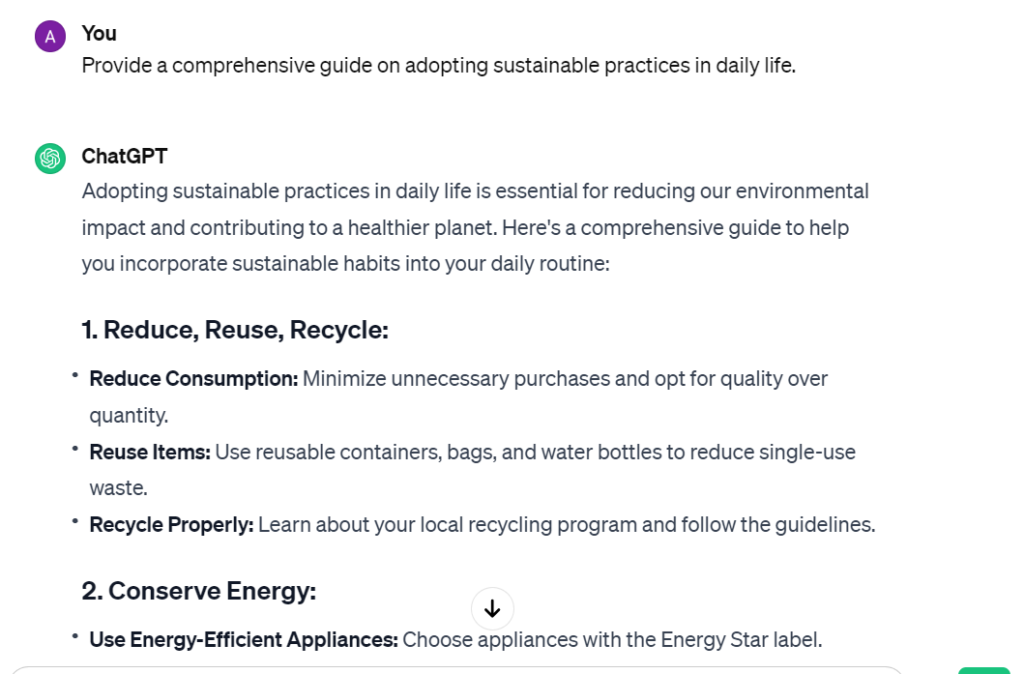
- Evolution of Social Media
Trace the historical development of social media and its influence on communication.
- Mental Health Awareness
Investigate the stigma around mental health, awareness efforts, and fostering understanding.
- Women in STEM
Examine the experiences of women in science, technology, engineering, and mathematics.
- Urbanization and Environment
Analyze the effects of rapid urbanization on the environment and discuss sustainable practices.
- Future of Education with Technology
Investigate the integration of technology in education, benefits, challenges, and changes in learning.
- Deep Sea Exploration
Delve into the world of deep-sea exploration, recent discoveries, and technological advancements.
- Psychology of Decision-Making
Examine the psychological factors influencing decision-making processes.
- Global Impact of Climate Change
Investigate the effects of climate change on biodiversity and ecosystems.
- Renewable Energy Adoption
Analyze the global transition to renewable energy sources and challenges.
- Art and Activism
Explore how art and creativity inspire social change and activism.
- Culinary Tourism
Dive into the world of culinary tourism, exploring the cultural significance of food.
- Science of Happiness
Investigate positive psychology, mindfulness, and factors contributing to overall well-being.
- Redefining Success Metrics
Discuss alternative metrics for measuring success beyond financial indicators.
- Social Media Influencers
Analyze the role of social media influencers in shaping consumer behavior.
- Preserving Indigenous Languages
Explore challenges faced by indigenous languages and strategies for preservation.
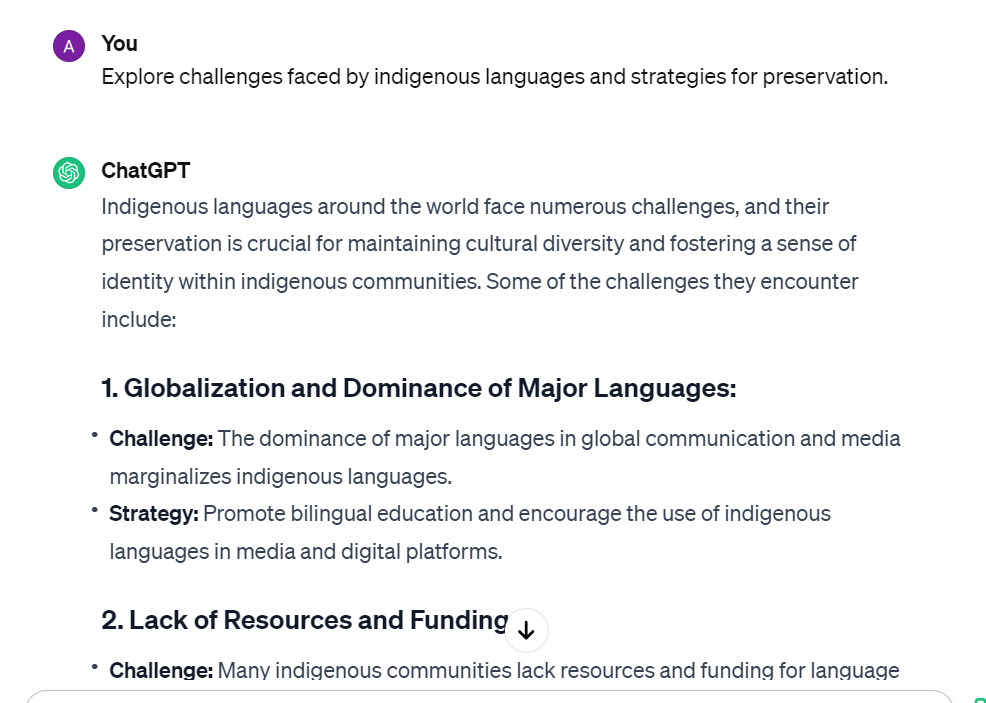
- Mindfulness in the Workplace
Examine the benefits of incorporating mindfulness practices in the workplace.
- Future of Space Exploration
Discuss advancements in space exploration technology and humanity’s quest beyond our solar system.
- Innovations in Sustainable Agriculture
Explore cutting-edge practices and technologies in sustainable agriculture, addressing global food challenges.
- The Psychology of Procrastination
Investigate the psychological factors behind procrastination, its impact, and effective strategies for overcoming it.
- The Influence of Art in Urban Spaces
Examine how public art shapes urban environments and contributes to cultural identity.
- Economic Disparities in Access to Healthcare
Analyze the economic factors influencing access to healthcare and propose solutions for reducing disparities.
- Exploring the Microbiome and Human Health
Investigate the role of the microbiome in human health, considering its impact on immunity, digestion, and overall well-being.
- The Rise of Online Education Platforms
Examine the growth of online education platforms, their benefits, challenges, and implications for traditional education.
- Understanding Sleep Patterns and Health
Explore the connection between sleep patterns, mental health, and physical well-being, offering insights into maintaining healthy sleep habits.
- Digital Privacy in the Era of Big Data
Analyze the challenges and implications of digital privacy in the age of big data, discussing potential solutions.
- The Psychology of Consumer Behavior
Investigate the psychological factors influencing consumer choices, exploring the role of advertising, branding, and social influence.
- Revitalizing Public Spaces in Urban Communities
Explore initiatives and strategies for revitalizing public spaces in urban communities, enhancing community engagement and well-being.
- The Impact of Plastic Pollution on Marine Ecosystems
Examine the consequences of plastic pollution on marine life, ecosystems, and the broader environment.
- The Intersection of Technology and Mental Health
Investigate how technology is used to address mental health challenges, exploring apps, online therapies, and emerging innovations.
- The Evolution of Electric Vehicles
Trace the development and adoption of electric vehicles, considering their environmental impact and future potential.
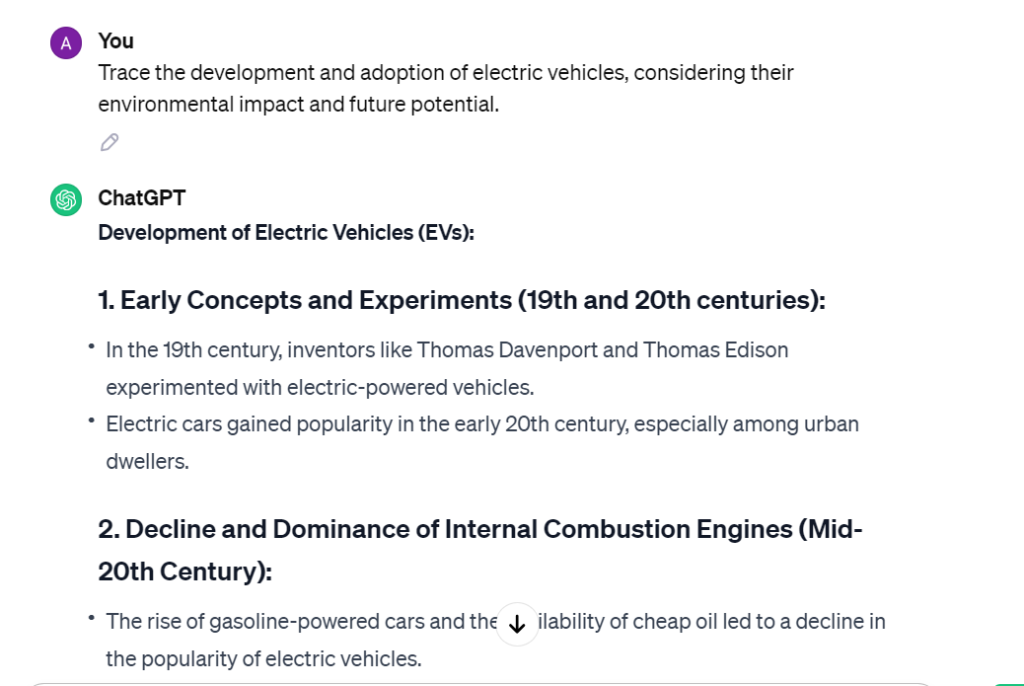
- The Role of Science Journalism in Public Understanding
Analyze the importance of science journalism in communicating complex scientific concepts to the public and fostering informed decision-making.
- Biotechnology and Genetic Engineering Advancements
Investigate recent advancements in biotechnology and genetic engineering, exploring their applications and ethical considerations.
- Addressing Mental Health in Schools
Examine strategies for incorporating mental health education and support in school settings, fostering emotional well-being among students.
- The Future of Sustainable Transportation
Explore innovations in sustainable transportation, including electric vehicles, public transit, and alternative fuels.
- The Psychology of Resilience in Adversity
Investigate the psychological factors that contribute to resilience in individuals facing adversity, exploring coping mechanisms and their impact on mental health.
- Cryptocurrency and Blockchain Applications Beyond Finance
Explore innovative applications of blockchain technology beyond cryptocurrencies, such as supply chain management, healthcare, and voting systems.
- The Science of Aging and Longevity
Investigate the scientific factors influencing the aging process and explore advancements in longevity research and anti-aging interventions.
- Exploring Indigenous Knowledge Systems for Sustainable Practices
Examine traditional indigenous knowledge and practices that contribute to sustainable living and environmental conservation.
- The Intersection of Technology and Environmental Conservation
Explore how technological innovations are being utilized in environmental conservation efforts, from monitoring to sustainable practices.
- The Psychology of Online Behavior
Analyze the psychological aspects of online behavior, including social media interactions, cyberbullying, and the impact of virtual environments on mental health.
- Biophilic Design:
Explore the principles of biophilic design and its impact on health, well-being, and productivity in urban spaces.
- The Global Impact of Microplastics on Ecosystems
Investigate the widespread implications of microplastics on terrestrial and aquatic ecosystems, exploring environmental and human health concerns.
- Regenerative Agriculture:
Explore the principles and practices of regenerative agriculture, showcasing how it goes beyond sustainability to restore ecosystems, improve soil health, and promote biodiversity.
- Mind-Body Connection:
Investigate the intricate relationship between physical exercise and mental health, exploring the psychological benefits of regular physical activity and its role in stress reduction and emotional well-being.
- The Science of Sleep:
Delve into the importance of sleep for overall health and well-being. Explore the science behind sleep, its impact on cognitive function, and strategies for improving sleep quality in a fast-paced world.
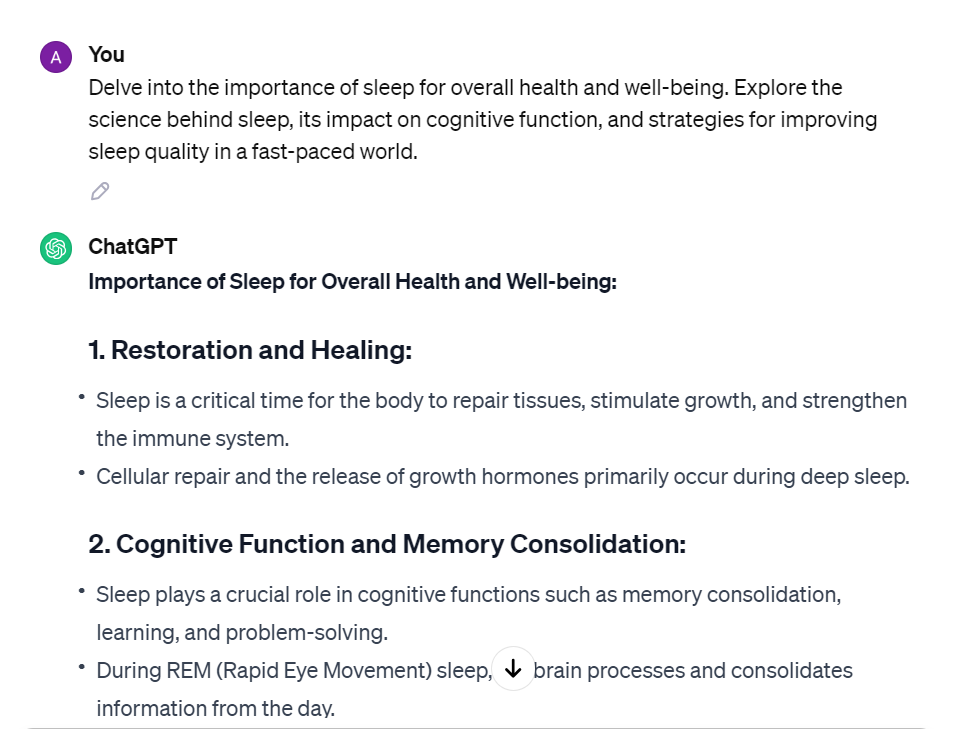
- Culinary Medicine:
Explore the emerging field of culinary medicine, examining how the integration of nutritional science into culinary practices can contribute to the prevention and management of various health conditions.
- Eco-Friendly Architecture:
Investigate the principles of eco-friendly architecture, exploring innovative design strategies, materials, and construction methods that prioritize environmental sustainability and energy efficiency.
- Community Resilience in the Face of Climate Change
Explore how communities around the world are adapting and building resilience in the face of climate change. Highlight local initiatives, sustainable practices, and community-led efforts to mitigate the impact of environmental challenges.
- The Art of Mindful Eating:
Examine the concept of mindful eating and its potential impact on health and well-being. Discuss how cultivating awareness and intentionality in eating habits can lead to a healthier relationship with food and improved overall wellness.
- The Role of Citizen Science in Environmental Monitoring
Examine the contribution of citizen science initiatives in monitoring environmental changes, biodiversity, and addressing ecological challenges.
- Navigating the Challenges of Online Education for Students with Disabilities
Explore the accessibility challenges and opportunities associated with online education for students with disabilities.
- The Future of Augmented Reality in Everyday Life
Analyze the potential applications and societal impacts of augmented reality technology in various aspects of daily life.
- The Resurgence of Traditional Crafts in the Modern World
Explore the revival of traditional craftsmanship and artisanal practices, examining the cultural significance and economic implications.
- Mindful Consumption:
Investigate the concept of mindful consumption, exploring ways individuals can make sustainable choices in their daily lives.
- The Influence of Parenting Styles on Child Development
Analyze various parenting styles and their impact on children’s cognitive, emotional, and social development.
- The Intersection of Technology and Accessibility for People with Disabilities
Explore how technological advancements are improving accessibility and inclusivity for individuals with disabilities.
- Ethical Considerations in Neuroenhancement Technologies Examine the ethical implications surrounding the use of neuroenhancement technologies for cognitive augmentation.
- The Impact of Soundscapes on Urban Well-being
Investigate how urban soundscapes influence the well-being of city dwellers, exploring noise pollution, calming environments, and the role of public spaces.
- The Evolution of Sustainable Fashion Practices
Explore the evolution of sustainable practices in the fashion industry, from eco-friendly materials to ethical production processes.
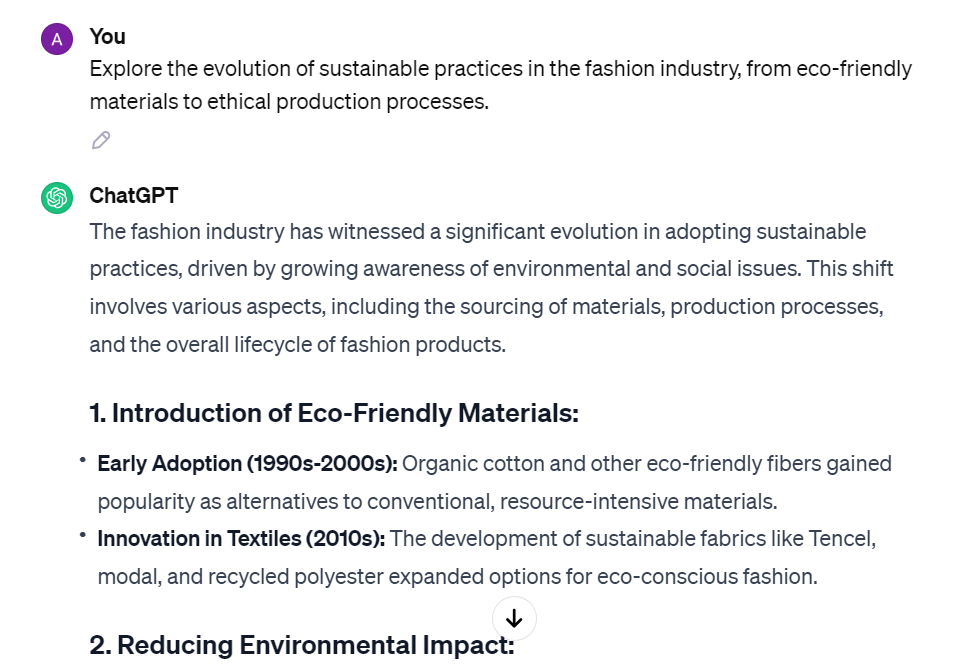
- The Psychology of Conspiracy Theories and Information Spread
Analyze the psychological factors that contribute to the spread and belief in conspiracy theories, exploring their impact on society and information dissemination.
- Refining Language and Style
Evaluate the language and style used in your nonfiction piece. Are there opportunities to enhance clarity, elegance, or conciseness?
- Strengthening Transitions
Review the transitions between paragraphs and sections. Are they smooth and logical? I want to craft a reading experience that flows like a gentle stream, carrying readers smoothly from start to finish without a ripple of confusion.
- Grammar and Punctuation Check
Conduct a thorough grammar and punctuation check. Look for any errors or inconsistencies that might affect the overall quality of the writing.
- Expanding on Key Points
Identify crucial points in your nonfiction piece. Are there areas where additional detail,examples, or supporting evidence could enhance the reader’s understanding?
- Trimming Excess
Are there sections that could be condensed without sacrificing meaning? Consider trimming any excess or redundant information.
- Enhancing Descriptive Elements
Focus on descriptive elements. Can you enrich the sensory experience for the reader by adding more vivid details or imagery?
- Ensuring Consistency
Check for consistency in terminology, formatting, and writing style throughout my nonfiction piece. By ensuring clear and consistent writing, I want to empower readers to trust my information and engage with it wholeheartedly.
- Engaging Openings and Closings
Evaluate my introduction and conclusion. Do they effectively capture and leave an impact on the reader? How can I employ captivating narratives, relatable characters, and unexpected twists to keep my readers glued to the page?
- Clarifying Complex Concepts
Identify any complex concepts or terminology. Are they explained clearly? Suggest How I can bridge the knowledge gap by incorporating clear explanations and relatable examples?
- Varying Sentence Structure
Assess sentence structure. Are there opportunities to vary sentence lengths and structures for a more dynamic and engaging rhythm?
- Incorporating Visual Elements
Consider the addition of visual elements like charts, graphs, or images to complement and enhance the understanding of key points.
- Checking for Redundancy
Look for redundancy in your writing. Are there repeated ideas or phrases? Streamline your content to avoid unnecessary repetition.
- Audience Engagement
Assess how well my nonfiction piece engages the target audience.What opportunities are there to further enhance the reader experience?
- Aligning with Purpose
Revisit the purpose of your nonfiction piece. Does every section contribute to that purpose? Trim or expand sections as needed to align with the overarching goal.
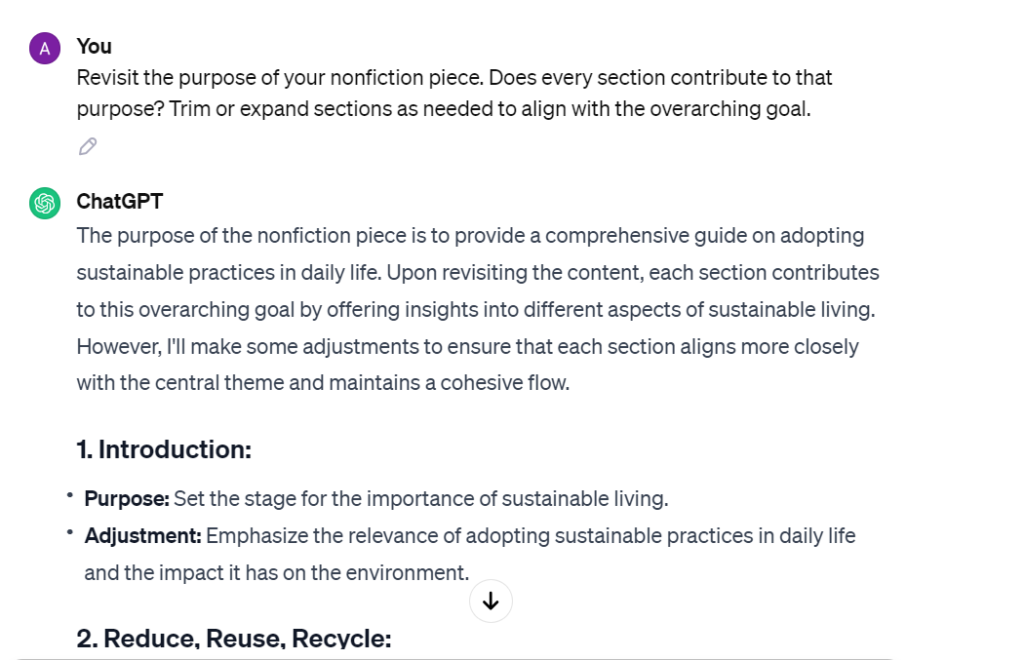
- Encouraging Reader Interaction
Explore opportunities for reader interaction. Can you include questions, prompts, or calls to action to engage the audience further?
- Evaluating Tone and Voice
Consider the tone and voice of your writing. Does it align with the intended mood and message? Adjust as needed for consistency.
- Ensuring Accessibility
Check for accessibility. Is your nonfiction piece accessible to a diverse audience? I’m committed to creating an inclusive environment. Explore adjustments to achieve insider adjustments to ensure inclusivity.
- Fact-Checking and Updates
Verify the accuracy of factual information. Are there any updates or recent developments that should be incorporated for relevance?
- Peer Review
Seek feedback from peers or beta readers. External perspectives can provide valuable insights for improvement.
- Polishing Overall Presentation
Review the overall presentation, including formatting, font choice, and layout. Ensure that the visual elements contribute to a polished and professional appearance.
- Capturing Reader Attention from the Start
Assess the effectiveness of your opening. Does it immediately engage the reader and set the tone for the entire piece?
- Balancing Depth and Accessibility
Strike a balance between providing in-depth information and ensuring accessibility. Ensure that even complex topics are presented in a way that is understandable to a broader audience.
- Creating Seamless Transitions between Ideas
Examine the transitions between different ideas and sections. Aim for seamless transitions that guide the reader smoothly from one point to the next.
- Fine-Tuning Word Choice for Precision
Pay attention to your choice of words. Can certain terms be replaced with more precise or impactful language to convey your message more effectively?
- Optimizing Paragraph Lengths for Flow
Review the length of your paragraphs. Are they well-balanced, contributing to the overall flow of the narrative? Consider adjusting lengths for optimal readability.
- Crafting Compelling Headlines and Subheadings
Evaluate the effectiveness of your headlines and subheadings. Do they accurately convey the content and entice the reader to continue?
- Injecting Anecdotes or Personal Insights
Consider incorporating anecdotes or personal insights where relevant. This can add a human touch and make your nonfiction piece more relatable.
- Ensuring Logical Progression of Ideas
Examine the logical progression of ideas throughout your piece. Confirm that each point naturally leads to the next, creating a cohesive narrative.
- Striving for a Consistent Tone
Check for consistency in tone. Ensure that the tone remains cohesive throughout the piece, aligning with the intended mood and message.
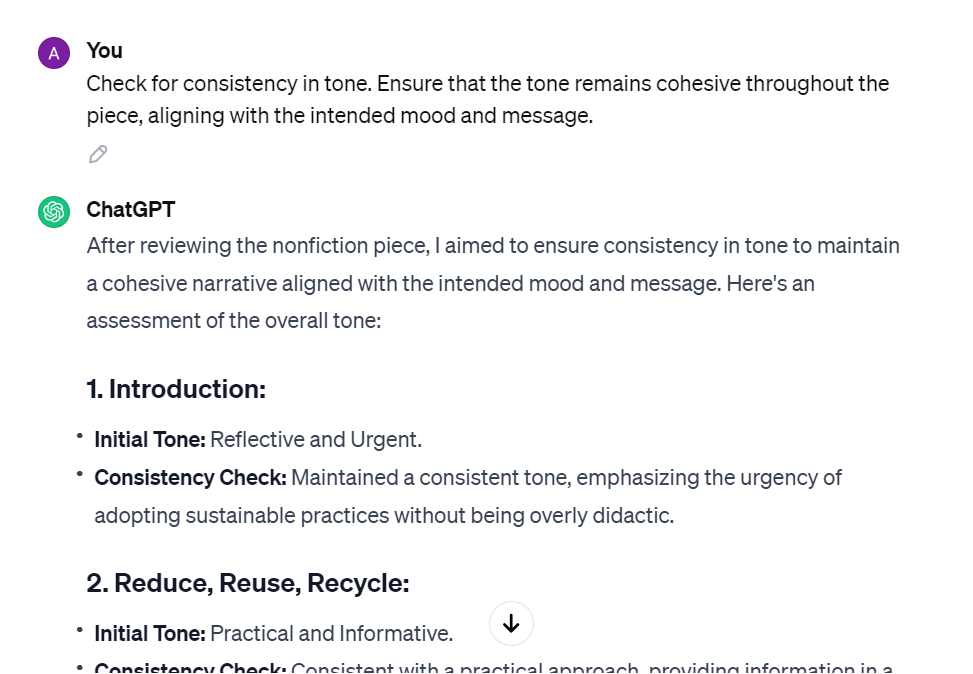
- Encouraging Critical Thinking
Prompt the reader to think critically. Are there opportunities to pose questions or present alternative viewpoints that encourage reflection?
- Polishing Concluding Remarks
Evaluate your concluding remarks. Do they effectively summarize key points and leave a lasting impression on the reader?
- Considering Readability Across Devices
Ensure that your nonfiction piece is readable across various devices. Test its appearance on different screens to guarantee a positive user experience.
- Soliciting Feedback on Readability
Seek feedback specifically on the readability of your piece. Inquire about any sections that may be challenging to understand or disrupt the flow.
- Integrating Relevant Quotes or Expert Opinions
Explore the inclusion of relevant quotes or opinions from experts. This can add credibility and depth to your nonfiction piece.
- Breaking Down Complex Information with Graphics
Assess the potential use of graphics to simplify complex information. Consider incorporating charts, diagrams, or illustrations for clarity.
- Addressing Common Misconceptions
Identify and address any common misconceptions related to your topic. Clarify points that might be misunderstood by the reader.
- Checking for Consistent Formatting
Review the formatting of your nonfiction piece. Ensure consistency in font, spacing, and other formatting elements for a professional appearance.
- Exploring Multimedia Enhancements
Consider multimedia enhancements, such as hyperlinks to additional resources, audio clips, or interactive elements, to enrich the reader’s experience.
- Incorporating Relevant Historical Context
Evaluate the inclusion of historical context where applicable. Providing a historical backdrop can deepen the reader’s understanding of the subject matter.
- Analyzing Engagement Metrics
If applicable, analyze engagement metrics if your piece is published online. Look at metrics like time spent on the page, bounce rate, and interactions to gauge reader engagement.
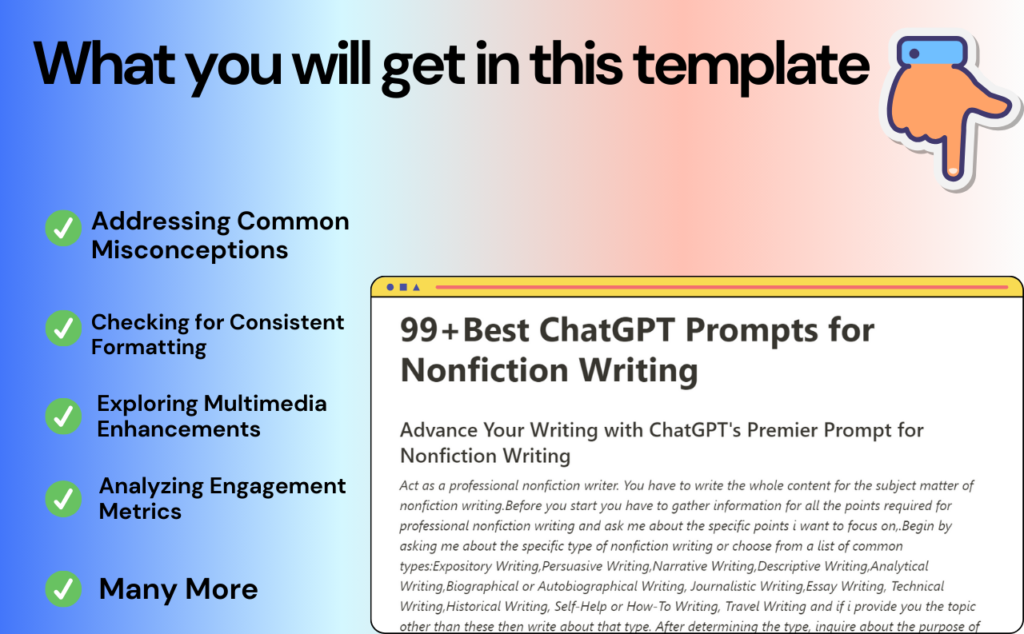
Get 99+ ChatGPT Prompts for Nonfiction Writing – Complete List Here!
Free Prompts forever – Complete Nonfiction Writing Prompts List
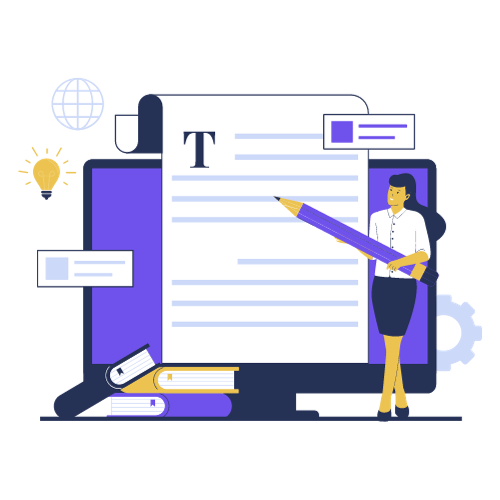
Final Thoughts:
In conclusion, by offering pre-built ChatGPT prompts, I am providing a solution for busy professionals in the AI landscape. These individuals understand the potential of AI but want to enhance efficiency within the provided time. With these pre-built prompts, they can save time, energy, and the hassle of crafting optimized prompts. ChatGPT prompts make tasks easier and more efficient. So why not give them a try and watch your writing and productivity soar? Happy writing!

